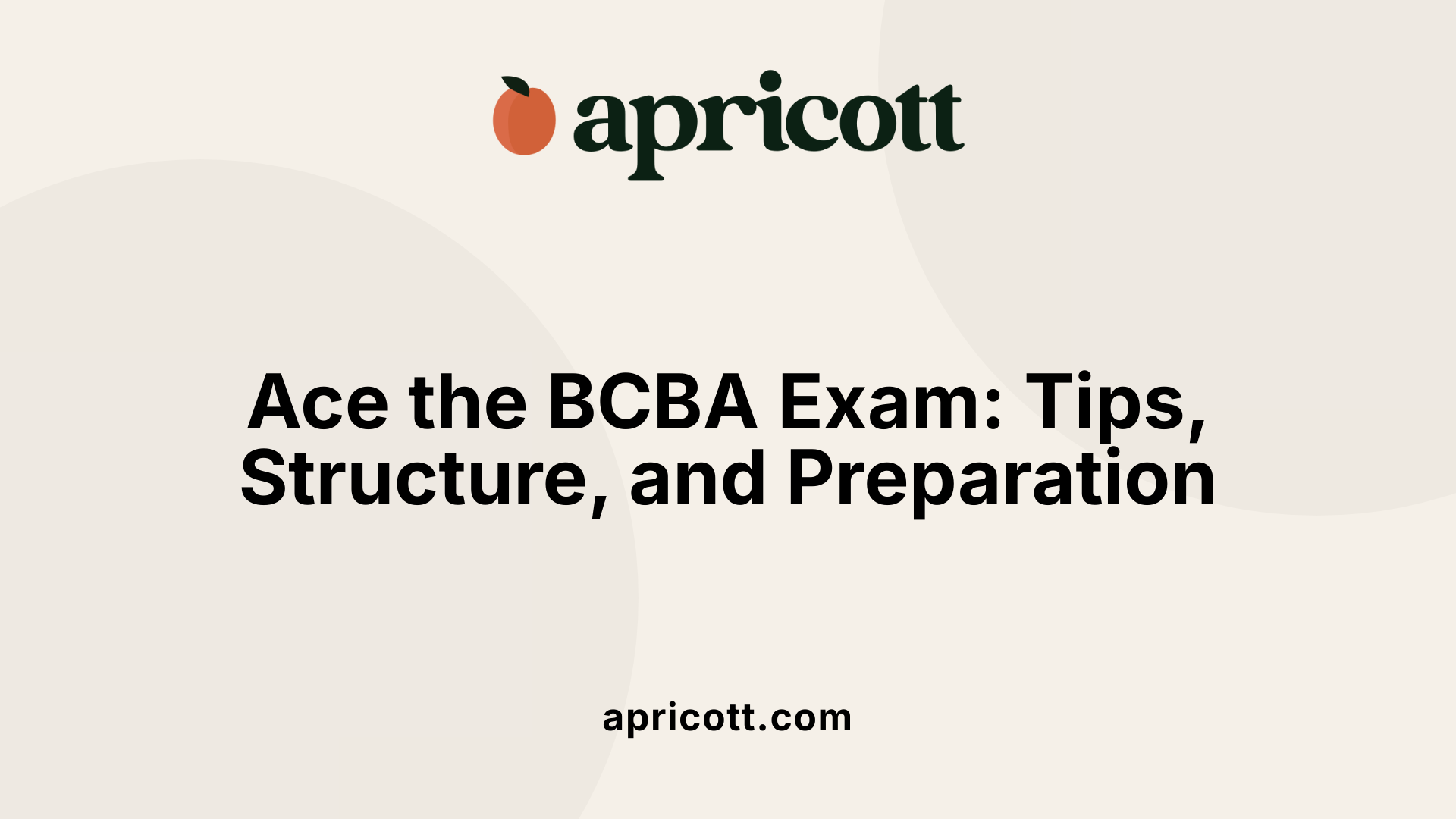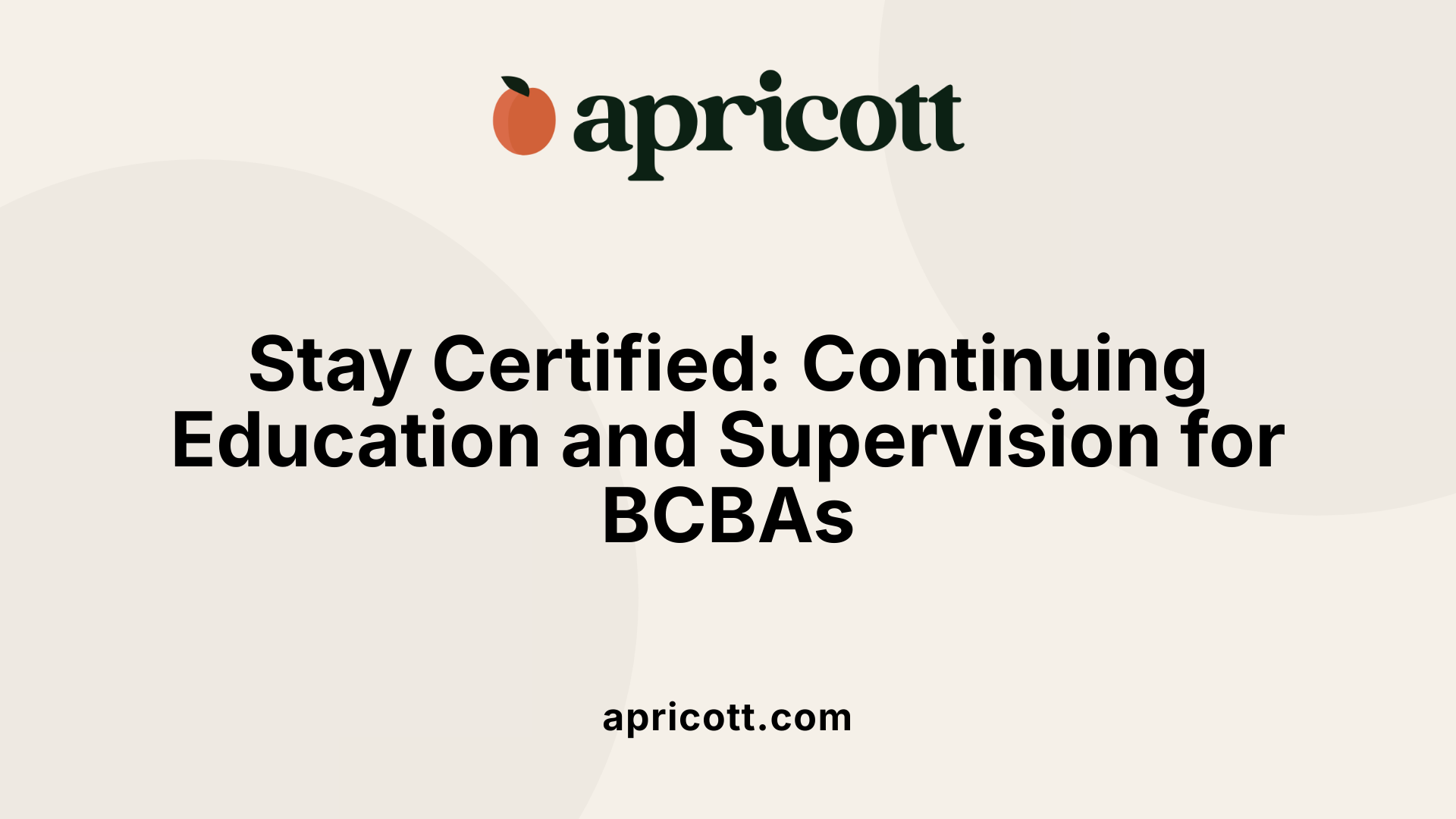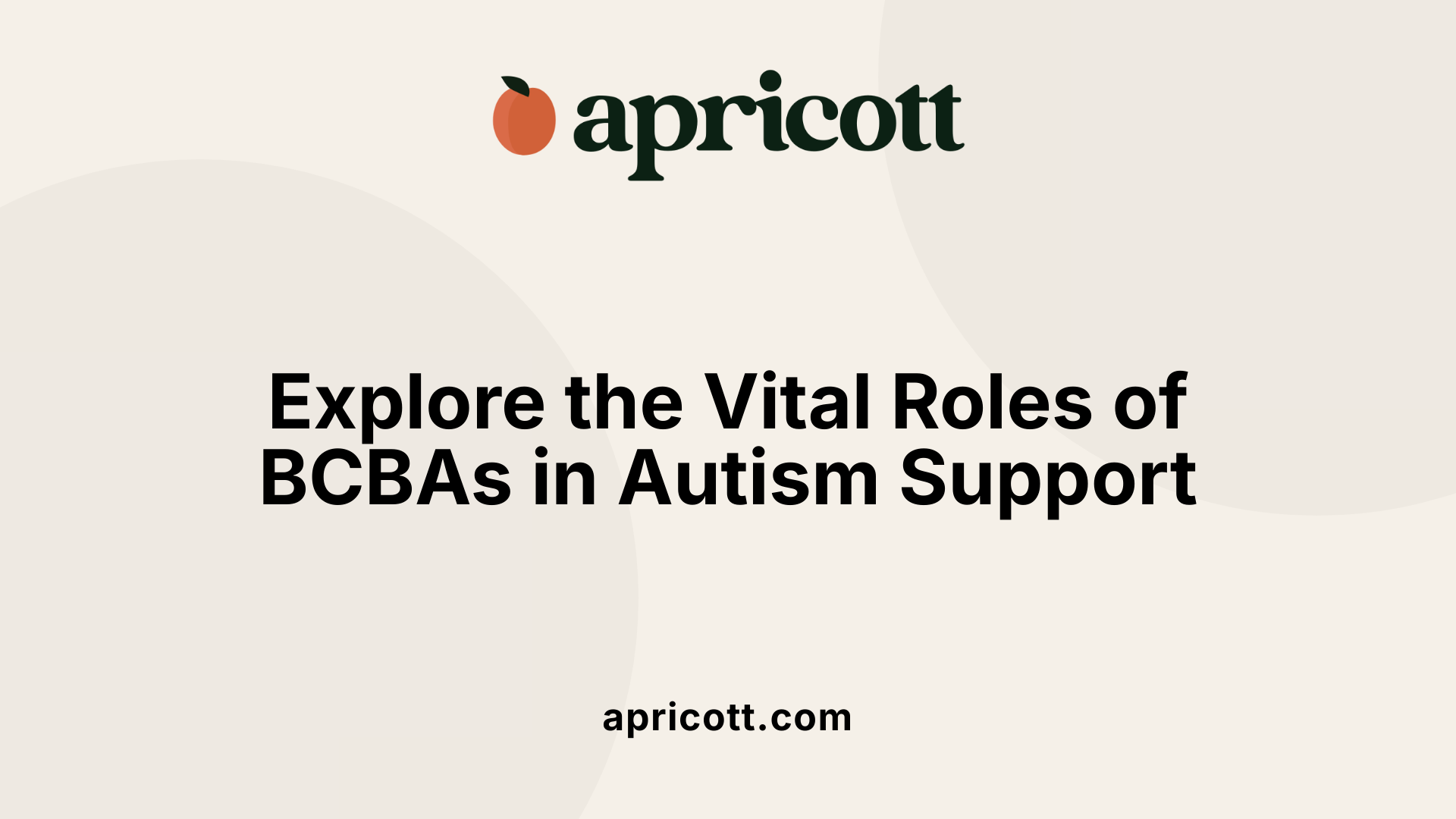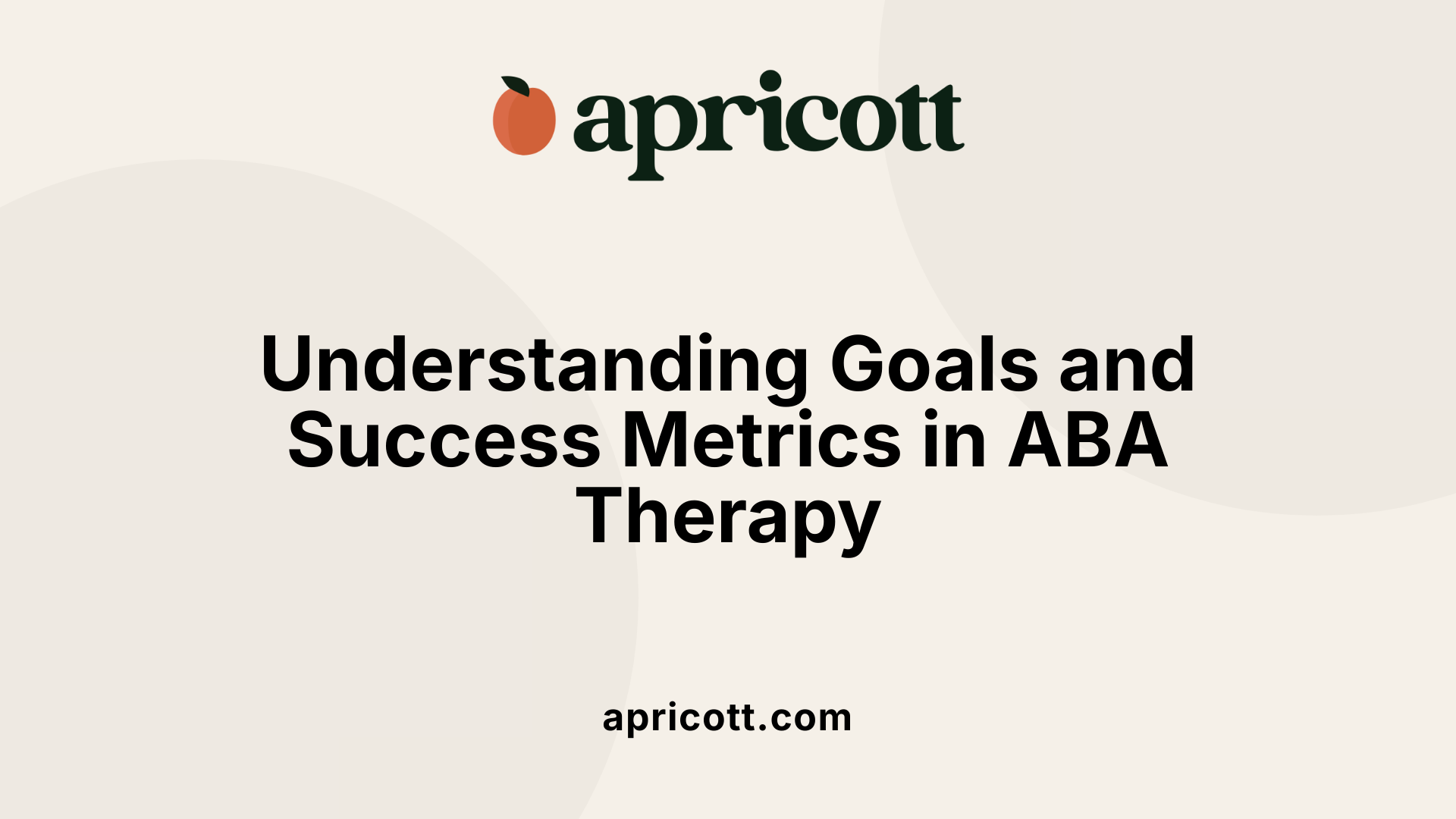December 2, 2025
Navigating the Path to Board Certification in Behavior Analysis
The role of a Board Certified Behavior Analyst (BCBA) is pivotal in delivering effective behavioral analysis therapy, especially for individuals with autism. This article outlines the comprehensive process of becoming a BCBA, detailing education, supervised experience, certification, and ongoing professional development. Aspiring behavior analysts can gain insight into the specialized training and commitment required to achieve this respected credential and positively impact lives through evidence-based interventions.
Behavioral analysis therapy for autism, often called Applied Behavior Analysis (ABA), is a scientifically validated therapy that focuses on enhancing meaningful skills such as communication, social interaction, and academic abilities. It works by reinforcing positive behaviors and reducing those that interfere with learning and daily functioning. ABA uses individualized treatment plans that include techniques like Discrete Trial Training and Pivotal Response Treatment.
A Board Certified Behavior Analyst (BCBA) is a graduate-level professional who designs, implements, and monitors ABA programs. BCBAs are qualified to deliver behavior-analytic services independently and supervise others like Registered Behavior Technicians (RBTs). To become a BCBA, candidates must complete a master's degree with verified coursework, accrue 1,500 to 2,000 hours of supervised fieldwork, and pass a rigorous certification exam. Maintaining certification requires ongoing education and adherence to ethical standards.
BCBAs provide support in various environments—including clinics, schools, homes, and healthcare settings—primarily assisting individuals with autism spectrum disorders and other developmental challenges. Their expertise centers on improving social, behavioral, and self-help skills, aiming to increase independence and quality of life across populations. The BCBA credential signifies a deep proficiency in behavior analysis, ensuring effective interventions tailored to individual needs.

To pursue BCBA (Board Certified Behavior Analyst) certification, candidates must have a graduate-level degree, typically a master's or doctoral degree. Common fields include psychology, education, and behavioral analysis, with programs designed to prepare students in Applied Behavior Analysis (ABA).
Candidates need to complete at least 270 hours of verified coursework approved by the Behavior Analyst Certification Board (BACB). This coursework covers essential ABA principles, ethics, experimental design, and behavior-change procedures.
The courses focus on foundational ABA knowledge, including:
Universities like Drexel University provide dedicated graduate programs in Applied Behavior Analysis that include verified course sequences meeting BACB standards. Drexel offers both a master's degree in ABA and post-master’s certificates for those who already hold a graduate degree.
These educational requirements form the bedrock of BCBA certification, ensuring practitioners have the comprehensive knowledge necessary for effective behavior analytic services.
Aspiring Board Certified Behavior Analysts (BCBAs) must complete supervised fieldwork to develop hands-on skills. There are two main types of fieldwork: standard supervised fieldwork, requiring 2,000 hours, and concentrated supervised fieldwork, which requires 1,500 hours. Both types focus on gaining real-world experience, but concentrated fieldwork offers a more accelerated path by increasing supervision intensity.
The supervision must be conducted by qualified BCBAs, ensuring ethical and professional development. Candidates typically complete a minimum of 20 hours per month of supervision that includes assessment, intervention, and data analysis. This rigorous oversight helps them build proficiency in applied behavior analysis techniques.
Practical experience can be gained in diverse environments, such as schools, clinics, healthcare, and home settings. These varied settings expose candidates to a broad range of behavioral challenges and client needs, especially serving individuals with autism spectrum disorders and other developmental disabilities.
Mentorship by experienced BCBAs is fundamental. Supervisors not only guide the application of behavior analytic principles but also uphold ethical standards. Their involvement ensures that candidates are competent in intervention design, implementation, and ethical collaborative practice—critical skills for independent certification and future professional responsibilities.

Candidates must first meet eligibility requirements by completing a graduate-level degree and requisite coursework. They then submit an application through their BACB online account for approval before scheduling the exam.
The BCBA exam includes approximately 160 to 185 multiple-choice questions. Candidates have a 4-hour window to complete the exam, which is administered in person at Pearson VUE testing centers.
The exam assesses knowledge in core applied behavior analysis domains such as experimental design, behavior-change procedures, and basic behavior analytic skills. This includes a strong emphasis on practical competencies relevant to service delivery and supervision.
Passing scores are established using the modified Angoff method, a criterion-referenced approach approved by the BACB Board of Directors. Scores are scaled to ensure fairness across different exam forms and do not depend on other candidates' results. Test takers receive immediate pass/fail results; those who do not pass are provided detailed reports to aid further study.
The BACB website offers comprehensive guidance on exam appointments, accommodations, reschedules, cancellations, and applicable fees, ensuring candidates are fully prepared for the exam day.

Board Certified Behavior Analysts (BCBAs) are required to recertify every two years to maintain their credential. This regular cycle ensures that professionals stay current in their field and continue to uphold the standards set by the Behavior Analyst Certification Board (BACB).
To successfully recertify, BCBAs must complete 32 Continuing Education Units (CEUs) within each two-year period. These CEUs cover a variety of topics pertinent to applied behavior analysis, ensuring ongoing professional growth. Additionally, BCBAs must adhere strictly to the BACB's ethics requirements during this time, reinforcing their commitment to ethical practice.
Certified BCBAs carry the responsibility of supervising other behavior analysis professionals, including Registered Behavior Technicians (RBTs) and Board Certified Assistant Behavior Analysts (BCaBAs). This supervision is a vital aspect of professional development, fostering growth and ensuring quality service delivery within teams.
Beyond BACB certification, many states require BCBAs to obtain licensure to practice legally within their jurisdiction. This process typically involves additional application procedures that vary by state. Staying informed about these licensure requirements is essential for compliance and to effectively serve clients in different settings.
By engaging in ongoing education, supervision duties, and navigating licensure processes, BCBAs enhance their expertise and contribute meaningfully to their profession and the individuals they support.

Board Certified Behavior Analysts (BCBAs) have diverse career opportunities across multiple settings. They commonly practice in clinics, schools, and home environments.
BCBAs serve crucial roles including direct therapy and supervision:
Collaboration with multidisciplinary teams is vital. BCBAs often work alongside psychologists, educators, speech therapists, and healthcare providers to ensure comprehensive care. This teamwork aims to integrate behavioral strategies with other therapeutic approaches.
BCBAs play a pivotal role in improving developmental outcomes for individuals with autism spectrum disorders. Through applied behavior analysis (ABA), they help enhance social skills, communication, adaptive behaviors, and reduce challenging behaviors. Their evidence-based interventions significantly contribute to the progress and quality of life for many children and families.
Behavioral analysis therapy for autism is usually administered by certified professionals specializing in ABA. BCBAs lead the treatment teams, supported by BCaBAs and RBTs, all meeting rigorous qualifications. Such teams operate in diverse environments—from homes and schools to clinics—providing tailored services to meet each child's unique needs.

Behavioral analysis therapy, especially Applied Behavior Analysis (ABA), focuses primarily on enhancing functional and helpful behaviors in individuals with autism. These goals include improving communication abilities, social skills, and daily living tasks such as toileting and dressing. ABA also aims to reduce harmful or interfering behaviors that might limit independence or social integration.
The therapy emphasizes teaching practical skills like requesting items, receptive and expressive language, and fostering emotional understanding. Social interactions and community skills are also targeted to support better integration and participation in everyday activities.
These goals are tailored for each individual following a comprehensive assessment by trained professionals. Structured interventions and positive reinforcement techniques are used throughout the therapy to help the learner progress in their unique strengths and challenges.
Effectiveness in ABA therapy is assessed through detailed and systematic data collection. Therapists track changes in specific target behaviors and newly learned skills using behavioral observations and metrics such as frequency, duration, and intensity.
Validated tools like the Kindergarten Inventory of Social/Emotional Tendencies (KIST) help quantify progress. Therapists set measurable goals and regularly update treatment strategies based on the recorded data to optimize outcomes.
Improvement in social skills, communication, emotional regulation, and reduction of problematic behaviors serve as primary indicators of success. Clinical research supports the effectiveness of ABA, showing notable gains in adaptive behaviors, social interaction, and overall daily functioning for individuals undergoing this therapy.
To obtain the BCBA-D (Doctoral) designation, applicants must first hold an active BCBA certification. Additionally, they need to meet specific doctoral degree and coursework requirements that align with recognized standards in behavior analysis.
Applicants must complete a doctoral program with coursework accredited by the Association for Behavior Analysis International (ABAI). This ensures the doctoral studies meet rigorous standards relevant to applied behavior analysis (ABA).
The application package for the BCBA-D includes submission of official transcripts, doctoral dissertations, detailed coursework information, mentorship documentation, scholarly publications, and records of postdoctoral experiences. These documents demonstrate the applicant's advanced expertise and scholarly contribution to the field.
Candidates can fulfill additional qualification components through postdoctoral mentorship, which provides guided practical experience, or through scholarly activities such as published research. These pathways offer flexibility in demonstrating advanced professional competency beyond coursework and examinations.
Becoming a Board Certified Behavior Analyst represents a rigorous yet fulfilling journey characterized by advanced education, intensive supervised practice, and a commitment to ongoing learning and ethical standards. For professionals passionate about making a difference in the lives of individuals with autism and other developmental disorders, the BCBA credential offers a pathway to expertise and trusted leadership in applied behavior analysis. Through steadfast dedication to the certification process and continued professional growth, BCBAs assume a vital role in shaping effective therapeutic interventions and fostering meaningful progress for those they serve.